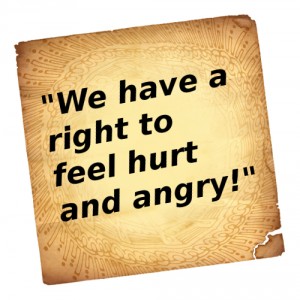 We Have a Right to Feel Hurt and Angry
We Have a Right to Feel Hurt and Angry
“Forgiveness begins with acknowledging that we are people who have a right to be treated with respect. Forgiveness does not require denying that we have been hurt. On the contrary, to forgive we have to admit that we have been hurt and that we have a right to feel hurt, angry, or resentful.”
Many good people have often been burdened with guilt because they felt angry or resentful towards another person who did them harm. This is especially true for Christians who admonish the value of forgiveness. To us, it is a command from God that we are obliged to do. Obliged. I don’t like that word very much. It’s like we are being “forced” to do something we don’t really like, something we can’t really understand and won’t result to our good anyway.
But is that true? Through the years, I have learned that God doesn’t just give us commands out of whim, but out of deep concern for our own good. It is out of compassion that He gave us His commandments, not out of dictatorship.
When God therefore admonished us to forgive, it is for our own good. But this kind of forgiveness is not the mechanical pardon we give to let people off the hook. Forgiveness is a process, and it starts with acknowledging our own God-given rights like our right to be respected.
We have a right to be treated with respect
Forgiveness starts by acknowledging our right for respect. What is respect? In my article “Why Is Respect Important in a Relationship?” I mentioned:
“To be respected is…to be valued as a person, and for our needs to be taken into consideration, especially those needs accorded to our dignity as human beings.”
When our rights are not being respected, we need to protect ourselves. We need not stay as helpless victims if we could do something to keep ourselves from further harm.
Following are some of the signs that we are no longer being respected:
- When we’re not being recognized
- When we’re not being allowed to be ourselves
- When our needs are taken for granted
- When we are judged and underestimated
- When we are forced or threatened
- When we’re not listened to when we have something to say
- When we’re treated as objects for use rather than as persons to be valued and loved
We have a right to feel hurt and angry
When our rights and our needs are not being met, we naturally have a right to feel hurt and angry. These feelings are signals that something is wrong, and that we have to do something to make things right again. God has enabled these feelings to work for our good so we could know we are already being harmed. Such harm does not only refer to physical danger but also to deep emotional wounds that may have a lasting impact in our lives.
Our hurts could be alerting us that someone is already violating our personal boundaries and we are already being manipulated. Our hurts could also be signals that a person no longer loves us, but is only using us for his ego or other needs.
Anger on the other hand is usually more intense as the violations we suffer may be greater or may need immediate attention.
God loves us. His command to “love others as we love ourselves” imply that we first know HOW to love and take care of ourselves. We are not outside of His mercies and His forgiveness.
We can choose to let go of our hurt and our anger
Once we understand why we are feeling hurt or angry, we are now in a better position to forgive. Why? We can now forgive because we know we already have a CHOICE.
We can choose to continue feeling angry and resentful, or we can choose to let go of those feelings. We are no longer obliged or forced to do so. We know we are not being told to forget it all and forget about our rights. We know we have a right to be respected, and once we are violated, we have a right to feel bad about it so we could do something to save ourselves from harm.
Now that we understand all these things, we can choose to feel bad about it, or we can choose to take up measures that will improve our situation.
Are you being manipulated by guilt? You can now detach yourself from being controlled and re-claim your freedom over your own actions.
Are you being pushed down so that other people can step over you? You can now create a considerable distance from those people who intend only to use you for their own selfish reasons.
Are you being verbally or physically abused in a relationship that doesn’t serve you well? You can now walk away and find healing. You can learn to love yourself again.
We have a right to feel hurt and angry. But once we already understand the situation, we are not obliged to punish ourselves by continuing to feel that way day after day after day. What we want is relief, healing and control over our own lives again. Claim your freedom and choose to let go of all things that do not serve you well.
Related Posts:
The Path to Forgiveness as the Path to Freedom
Be Less Angry, Be More Powerful
Check Jocelyn's books:
"Of Waves and Butterflies: Poems on Grief", "Mend My Broken Heart", "Questions to God", "To Love an Invisible God", "Defending My Catholic Faith", and more - click here.
(You may freely quote excerpts from this website as long as due credit is given to author Jocelyn Soriano and the website itakeoffthemask.com)
One reply on “We Have a Right to Feel Hurt and Angry”
Excellent!!!